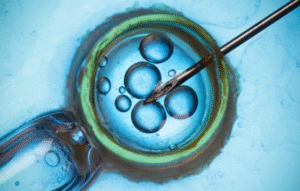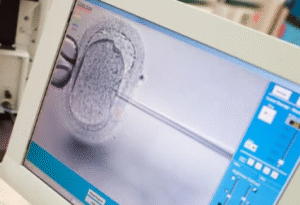Artificial Intelligence (AI) has made significant inroads in almost every sector, including healthcare. One area where AI’s impact is increasingly evident is reproductive medicine, particularly in In Vitro Fertilization (IVF) and Intracytoplasmic Sperm Injection (ICSI). Both IVF and ICSI are advanced assisted reproductive technologies (ART) designed to address infertility, but they differ significantly in their approach and implementation. With the advent of AI, both procedures are witnessing transformative improvements.
In this comprehensive article, we will compare IVF vs ICSI, focusing on how AI integration is revolutionizing these processes. We will explore success rates, procedural advancements, challenges, ethical concerns, and the future of AI in reproductive medicine.
Understanding Assisted Reproductive Technologies (ART)
What Are ARTs?
Assisted Reproductive Technologies (ART) include medical treatments and procedures aimed at enhancing fertility or enabling pregnancy. The most common ART techniques are:
- IVF (In Vitro Fertilization)
- ICSI (Intracytoplasmic Sperm Injection)
- Artificial Insemination (AI)
- Gamete Intrafallopian Transfer (GIFT)
Among these, IVF and ICSI are the most prominent and widely practiced methods.
What Is In Vitro Fertilization (IVF)?


Procedure and Process
IVF involves stimulating the ovaries to produce multiple eggs, which are then retrieved and fertilized with sperm in a laboratory setting. The resulting embryos are cultured for several days before being transferred to the uterus.
When Is IVF Recommended?
IVF is commonly recommended for:
- Women with blocked or damaged fallopian tubes.
- Cases of ovulation disorders or diminished ovarian reserve.
- Couples with unexplained infertility.
- Genetic disorders where preimplantation genetic testing (PGT) is required.
What Is Intracytoplasmic Sperm Injection (ICSI)?


Procedure and Process
ICSI is a specialized form of IVF where a single sperm cell is directly injected into an egg using a fine needle. This procedure is particularly beneficial when male infertility factors are present.
When Is ICSI Recommended?
ICSI is recommended in the following situations:
- Severe male infertility, such as low sperm count or poor motility.
- Previous IVF failure.
- Abnormal sperm morphology.
- When sperm has been retrieved surgically (e.g., from the epididymis or testes).
Artificial Intelligence Vs IVF and ICSI – A Comparative Study
Why Use AI in IVF and ICSI?
Artificial Intelligence plays a vital role in enhancing IVF and ICSI by:
- Automating Embryo Selection: AI algorithms evaluate embryo quality with unprecedented precision.
- Predicting Pregnancy Success: Machine learning models predict pregnancy chances based on various data points.
- Optimizing Sperm Selection: Advanced imaging and AI help identify the most viable sperm for ICSI.
Applications of AI in IVF and ICSI
| AI Integration | IVF | ICSI |
| Embryo Selection | ✅ | ✅ |
| Sperm Selection | ✅ | ✅ |
| Predicting Pregnancy Outcomes | ✅ | ✅ |
| Automating Workflow | ✅ | ✅ |
| Data Analysis and Pattern Recognition | ✅ | ✅ |
AI Integration in IVF: How It Works?


Enhancing Embryo Selection
AI technology is utilized to enhance embryo selection through:
- Time-Lapse Imaging: Analyzing embryonic development in real time.
- Morphokinetic Analysis: Evaluating embryo quality based on morphological features and development rates.
- Predictive Models: Identifying embryos with the highest implantation potential.
Predicting Pregnancy Outcomes
By analyzing thousands of data points, AI predicts pregnancy outcomes with greater accuracy than traditional methods. These models consider:
- Patient Age
- Hormonal Profiles
- Genetic Data
- Previous Pregnancy History
Automating Laboratory Workflows
AI helps in automating time-consuming tasks, including:
- Embryo Grading
- Monitoring Cell Division Rates
- Data Entry and Analysis
AI Integration in ICSI: Revolutionizing Sperm Selection
Advanced Sperm Selection Techniques
Traditional sperm selection relies heavily on visual analysis, which is prone to human error. AI enhances this by:
- Analyzing Sperm Motility and Morphology: Identifying the most viable sperm.
- Real-Time Monitoring: Ranking sperm based on movement patterns and morphology.
- Automating Injection Processes: Reducing the risk of human error.
Improving Fertilization Success Rates
AI has demonstrated proficiency in predicting which sperm-egg combinations have the highest likelihood of successful fertilization, significantly improving ICSI outcomes.
Comparing IVF and ICSI Success Rates
IVF Success Rates
- The average success rate of IVF is around 30-40% per cycle.
- Success rates are influenced by factors such as maternal age, egg quality, and the underlying cause of infertility.
ICSI Success Rates
- ICSI generally offers a slightly higher success rate, around 50-60% per cycle, particularly in cases of male infertility.
- The direct injection of a single sperm cell increases fertilization rates but does not necessarily improve live birth rates compared to IVF.
Advantages of AI-Enhanced IVF and ICSI
- Increased Accuracy: AI-driven embryo and sperm selection lead to higher accuracy and efficiency, significantly reducing human error.
- Enhanced Success Rates: The use of predictive algorithms improves the chances of selecting the best embryos and sperm, boosting success rates.
- Cost and Time Efficiency: Automating routine tasks reduces the time spent in the laboratory and lowers the overall cost of treatment.
Challenges and Ethical Considerations
Data Privacy and Security: Handling sensitive medical data requires robust encryption and compliance with regulations like GDPR.
Ethical Implications: AI algorithms must be transparent to avoid bias and ensure that automated decisions are trustworthy.
Human-AI Collaboration: While AI can significantly assist embryologists, it should not completely replace human expertise. A balanced approach is essential.
Future Trends in AI and Fertility Treatments
Personalized Medicine: AI will continue to enable customized treatment protocols tailored to individual patient profiles.
Real-Time Decision Support: AI will guide embryologists and clinicians in making real-time decisions during IVF and ICSI procedures.
Predictive Maintenance of Laboratory Equipment: AI can monitor the functioning of lab devices and predict maintenance needs, ensuring uninterrupted operations.
Conclusion
Artificial Intelligence is poised to revolutionize the field of reproductive medicine, particularly in IVF and ICSI. By enhancing accuracy, reducing human error, and optimizing treatment outcomes, AI holds the promise of making fertility treatments more efficient and successful. However, challenges related to data privacy and ethical practices must be addressed for widespread adoption.
As technology evolves, so too will the capabilities of AI in ART. Clinics that embrace AI-driven approaches stand to offer better outcomes for couples struggling with infertility, making parenthood a more achievable dream.
FAQ – Artificial Intelligence Vs IVF and ICSI


Is ICSI more successful than IVF?
Yes, ICSI is often considered more successful than conventional IVF, especially in cases involving male infertility factors like low sperm count or poor motility. The success rate of ICSI ranges from 50% to 60% per cycle, while IVF typically has a success rate of 30% to 40% per cycle. However, the success of both methods largely depends on the quality of the eggs, sperm, and overall health of the parents.
Why is ICSI risky?
ICSI can carry certain risks primarily because it involves manually injecting a single sperm directly into an egg. Some of the risks associated with ICSI include:
- Increased Risk of Genetic Disorders: Since ICSI bypasses natural sperm selection, there is a higher chance of passing on genetic abnormalities.
- Fertilization Failure: If the sperm is not viable or the egg is damaged during injection, fertilization may not occur.
- Birth Defects: Some studies suggest a slightly increased risk of birth defects compared to natural conception.
- Egg Damage: The process of injecting the sperm can potentially damage the egg, making it non-viable.
Despite these risks, the vast majority of ICSI babies are born healthy, and the technique remains one of the most effective solutions for severe male infertility.
Do ICSI babies come early?
There is no definitive evidence suggesting that ICSI babies are more likely to be born prematurely compared to babies conceived through natural means or IVF. However, some studies have shown a slight increase in the chances of preterm birth and low birth weight, but these risks are more closely associated with underlying infertility issues rather than the ICSI procedure itself. In general, with proper prenatal care, most ICSI pregnancies proceed without complications.
Which gender is more common in ICSI?
Research has indicated that ICSI is slightly more likely to result in the birth of male infants compared to female infants. This is because Y-chromosome-bearing sperm are typically more motile than X-chromosome-bearing sperm. However, the difference is not substantial, and both male and female offspring are commonly born through ICSI.
Do ICSI babies look like their parents?
Yes, ICSI babies inherit genetic material from both parents just like naturally conceived babies, so they do look like their parents. Since the genetic material from both the egg and sperm is combined during fertilization, the resulting embryo carries DNA from both parents. Therefore, the physical resemblance between ICSI babies and their parents is no different from naturally conceived children.




